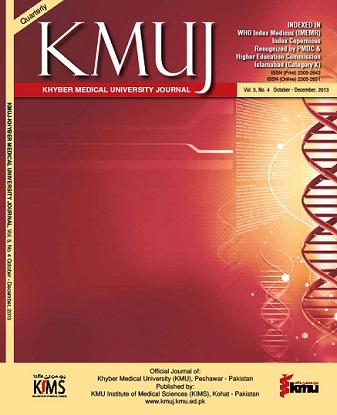CARDIOGENIC SHOCK IN ADULT PATIENTS WITH NON-ST ELEVATION MYOCARDIAL INFARCTION
Main Article Content
Abstract
Objective: To study the frequency of cardiogenic shock in patients with non-ST elevation myocardial infarction (Non-STEMI).
Methodology: This descriptive cross-sectional study was conducted from May 2011 to October 2011, at cardiology department of Hayatabad medical complex, Peshawar. Sample size was calculated using WHO sample size as 600 patients. Consecutive non probability sampling technique was used. All patients with diagnosed Non-STEMI, meeting the inclusion criteria were enrolled in the study after taking informed consent. All patients were admitted in the cardiology unit and were evaluated for cardiogenic shock on the basis of operational definitions and were managed as per ward and unit protocols. All relevant information was recorded in a predesigned proforma.
Results: Out of 600 patients, 408(68%) patients were male and 192(32%) patients were female. Mean age of the patients was 60±1.26 years and majority (n=246; 41%) of patients were in age range 61-70 years. Overall 30 (5%) patients with Non-STEMI developed cardiogenic shock. Out of 30 patients, 6 (20%) patients were in age range 51-60 years, 8 (26.7%) patients were in age range 61-70 years and 16 (53.3%) patients were above 70 years of age. Mean time interval from onset of chest pain and ECG diagnosis of myocardial infarction was 8±2.71 hours. In patients with cardiogenic shock, 16 (53.3%) and 10 (33.3%) patients had time interval of 4-8 hours and >8-16 hours respectively.
Conclusion: Cardiogenic shock occurs in 5% patients with Non-STEMI in our set up and is more common in patients above 70 years of age.
Article Details
Work published in KMUJ is licensed under a
Creative Commons Attribution 4.0 License
Authors are permitted and encouraged to post their work online (e.g., in institutional repositories or on their website) prior to and during the submission process, as it can lead to productive exchanges, as well as earlier and greater citation of published work.
(e.g., in institutional repositories or on their website) prior to and during the submission process, as it can lead to productive exchanges, as well as earlier and greater citation of published work.
References
Saleheen D, Zaidi M, Rasheed A, Ahmad U, Hakeem A, Murtaza M, et al. The Pakistan risk of myocardial infarction study: A resource for the study of genetic, lifestyle and other determinants of myocardial infarction in south Asia. Eur J epedemiol 2009:24;329-38.
Abegunde DO, Mathers CD, Adam T, Ortegon M, Strong K. The burden and cost of chronic diseases in low income and middle income countries. Lancet 2007:370:1928-38.
Rosamond W, Flegal K, Furie K, Go A, Greenlund K, Haase N et al. Heart disease and stroke statistics--2008 update: a report from the American Heart Association Statistics Committee and Stroke Statistics Subcommittee. Circulation 2008; 117(4):e25-146.
Towfighi A, Zheng L, Ovbiagele B. Sex-specific trends in midlife coronary heart disease risk and prevalence. Arch Intern Med 2009;169(19):1762-6.
Teoh M, Lalondrelle S, Roughton M, Grocott-Mason R, Dubrey SW. ACS and its presentation in Asian Caucasian patients in Britain. Heart 2007;93:183-8
Rosamond W, Flegal K, Friday G, Furie K, Go A, Greenlund K, et al. Heart disease and stroke statistics-2007 update: A report from the American heart association statistics committee and stroke statistics subcommittee. Circulation 2007:115. 115(5):e69-171.
Jafary MH, Samad A, Ishaq M, Jawaid SA, Ahmad M, vohra EA. Profile of acute myocardial infarction (AMI) in Pakistan. Pak J Med Sci 2007; 23(4):485-9.
Reynolds HR, Hochman JS. Cardiogenic shock: current concepts and improving outcomes. Circulation 2008;117:686.
Boden WE, O'rourke RA, Teo KK, Hartigan PM, Maron DJ, Kostuk W, et al: The evolving pattern of symptomatic coronary artery disease in the United States and Canada: Baseline characteristics of the Clinical Outcomes Utilizing Revascularization and Aggressive DruG Evaluation (COURAGE) trial. Am J Cardiol 2007;99(2):208-12.
Holmes DR Jr, Berger PB, Hochman JS, Granger CB, Thompson TD, Califf RM, et al. Cardiogenic shock in patients with acute ischemic syndromes with and without ST-segment elevation. Circulation. 1999 Nov 16; 100(20):2067-73.
Jacobs AK, French JK, Col J, Sleeper LA, Slater JN, Carnendran L, et al. Cardiogenic shock with non-ST-segment elevation myocardial infarction: a report from the SHOCK trial registry. J Am Coll Cardiol.2000;36:1091–96.
Goldberg RJ, Gore JM, Alpert JS, Osganian V, de Groot J, Bade J, et al. Cardiogenic shock after acute myocardial infarction. Incidence and mortality from a community-wide perspective, 1975 to 1988. N Engl J Med. 1991 Oct 17; 325(16):1117-22.
Holmes DR Jr, Bates ER, Kleiman NS, Sadowski Z, Horgan JH, Morris DC, Califf RM, Berger PB, Topol EJ. Contemporary reperfusion therapy for cardiogenic shock: the GUSTO-I trial experience. The GUSTO-I Investigators. Global Utilization of Streptokinase and Tissue Plasminogen Activator for Occluded Coronary Arteries. J Am Coll Cardiol. 1995; 26(3):668-74
Tipoo FA, Quraishi AR, Najaf SM, Kazmi KA, Jafary F, Dhakam S, Shafquat A. Outcome of cardiogenic shock complicating acute myocardial infarction. J Coll Physicians Surg Pak. 2004; 14(1):6-9.
Polonsk L, Gasior M, Gierlotka M, kalarus Z, Cielinski A, Dubiel SJ, et al. Polish registry of acute coronary syndromes(PL-ACS) characteristics, treatments and outcomes of patients with acute coronary syndromes in Poland. Kardiol Pol 2007;65:861-72.
